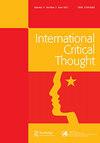The Scientific Meaning and Contemporary Implications of Marx’s Proposition on the Conditions for the Destruction of an Older Social Formation and the Establishment of Superior Relations of Production
IF 0.4
Q4 POLITICAL SCIENCE
引用次数: 0
Abstract
ABSTRACT Marx’s proposition concerning the conditions under which older social formations are destroyed and superior relations of production become established represents a fundamental concept of scientific socialism. No social formation ceases to exist so long as the relations of production that underlie it are still capable of driving the development of the productive forces at a relatively rapid pace. Here, the term “productive forces” refers to the overall state of the productive forces in all the countries that make up the social formation as a whole, and not just to the productive forces of one or several countries. Once the material conditions have matured for a social formation that corresponds to these conditions, that new social formation will come into being. The “material conditions for its existence,” of course, cannot simply be equated with the productive forces. A correct understanding of the changing material conditions involved is essential for a firm confidence in the socialist ideal, and for a determined strategic pursuit of the socialist course.马克思 "关于旧社会形态的破坏和优越生产关系的建立的条件 "命题的科学内涵和当代意义
摘要 马克思关于旧的社会形态在什么条件下灭亡、优越的生产关系在什么条件下建立的命题,是科学社会主义的一个基本概念。只要作为其基础的生产关系仍然能够推动生产力以较快的速度发展,任何社会形态都不会不复存在。这里的 "生产力 "是指构成社会形态的所有国家生产力的总体状况,而不仅仅是指一个或几个国家的生产力。一旦符合这些条件的社会形态的物质条件成熟,新的社会形态就会出现。当然,"存在的物质条件 "不能简单地等同于生产力。正确认识不断变化的物质条件,是坚定社会主义理想信念、坚定社会主义道路战略追求的关键。
本文章由计算机程序翻译,如有差异,请以英文原文为准。
求助全文
约1分钟内获得全文
求助全文

 求助内容:
求助内容: 应助结果提醒方式:
应助结果提醒方式:


